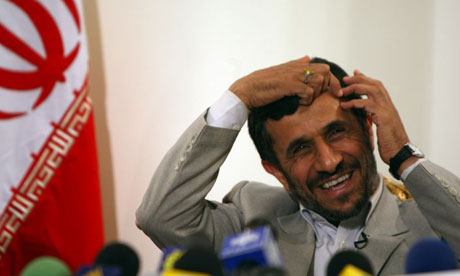Monday, May 17, 2010
by William Harris
The futility of containment.
When Iran Pakistan , we know that no nuclear power will transfer a device to a private army of the religious elect like Hezbollah in Lebanon Washington
Proponents of containing a nuclear Iran in and around the Obama administration conceive of deterring Iran Arabia .
In any case, Iran has a strategic extension across the Middle East to the Mediterranean that puts it beyond containment. On February 25, Iranian President Mahmoud Ahmadinejad, Syrian President Bashar al-Assad, and Hezbollah Secretary-General Hassan Nasrallah met in Damascus Syria only looks forward to more gains from the partnership as Iran Syria to steer away from Iran
What of Hezbollah? Thanks to Western promoted demoralization of the West's own friends in Lebanon , Hezbollah has advanced from commanding a large part of Lebanon Lebanon is more than ever the business end of Iran
Hezbollah is integral to the ruling clerical and military establishment in Iran Iran Israel , in the heart of the Arab world, and half way to Europe .
It would be entirely within character for the Iranian Revolutionary Guard to establish a clandestine strategic unit in Lebanon Israel without needing to use ballistic missiles; deniability (at least in the mind of Tehran ); and a secret reserve outside Iran Iran might implement a nuclear transfer to its base in Lebanon
When Ahmadinejad speaks of Nasrallah's uprooting Israel Iran
Hezbollah having any link to nuclear devices is terrifying, not least for Lebanese Shiites. The party combines technical sophistication, global reach, and delusional demagogy. For Nasrallah , Israel Iran
The future is bleak; the Lebanese mountain communities sport a history of disastrous miscalculations. The Druze lord Fakhr al-Din Ma'n invited and received an Ottoman avalanche after he expanded east to Palmyra and north toward Aleppo Lebanon
In the meantime, U.S. engagement of Syria Beirut
What to do? Suspending the policy of engaging Syria and Iran Lebanon , international justice might still pull down Iran 's friends in the Levant . To the east, Iraq should not be considered hostage to engagement; the determination of the Syrian and Iranian regimes to wreck a pluralist Iraq Iran Iran
President Obama has spoken of proceeding "boldly and quickly."
So far this is just hot air.
William Harris, is a professor at the University of Otago , New Zealand
Copyright - Original materials copyright (c) by the authors.


